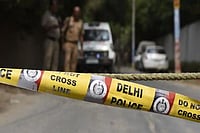Does the right to practice religion extend to school uniforms? That's the question the Supreme Court of India has asked while hearing a clutch of petitions challenging the Karnataka High Court verdict refusing to lift the ban on hijab in educational institutions of the state,
"You may have a religious right to practice whatever you want to practice. But can you practice and take that right to a school which has a uniform as a part of dress you have to wear? That will be the question," said a bench of Justices Hemant Gupta and Sudhanshu Dhulia.
The apex court observed that schools have a prescribed uniform and while every person in India is entitled to the right to practice their religion, the question remained whether such practice included changes in prescribed uniform.
The question brought back a familiar debate regarding the separation of religion and state and to what extent the right to practice religion can be used by individuals.
Hijab ban in Karnataka
On February 5, 2022, the Karnataka government ordered a ban on "wearing clothes that disturb equality, integrity, and public order in schools and colleges". The ban led to outrage from communities and a series of protests from Mulsim girls, some of whom even challenged the ban in High Court.
In March, the Kerala High Court upheld the ban. The case has since moved to the Supreme Court. Critics of the ban argue that not only is the hijab ban in schools in contradiction to the constitutionally guaranteed right to religious freedom of every Indian but also detrimental to the future of education among Muslim girls.
What is the rationale for a ban on hijab?
The order of the ban on hijab in Karnataka specifically mentions "clothes that disturb equality, integrity, and public order in schools and colleges".
While hearing the pleas challenging the ban, the SC made an important observation: “Can students wear anything they want in school and shouldn't religious practice be kept aside?”
Students from several communities across India wear sport and multiple items of religious symbolism and faith. The 'kada' and headdress (pagdi) worn by Sikh children, tilak or shaved head sported by Hindus, hijab or other forms of face covering by Muslim girls, crosses worn on chains by Christian students. Mustaches are also often worn by upper caste students in colleges as a sign of caste pride.
As the SC noted on Tuesday, the "State was cautious not to prescribe any uniform but kept it open for every institution to prescribe a uniform". Would such a ban on hijab in Karnataka government schools and colleges (as an expression of faith) also mean a ban on these other items of religious faith? And to what extent will it extend? What about government institutions and offices?
The ban further raise the question, of whether wearing hijab is an essential practice under Article 25 of the Constitution. While sidestepping the question, the SC bench observed, "What we are saying is whether in a government institution you can insist on carrying your religious practice. Because the Preamble says ours is a secular country."
While arguing for the ban, Additional Solicitor General (ASG) K M Nataraj said, "Somebody in the guise of his religious practice or religious right cannot say that I am entitled to do this therefore I want to violate the discipline of the school" Advocate General of Karnataka Prabhuling Navadg also noted that "this government order does not interdict any of the rights of the students".
Religion, state and secularism
India is a secular nation with no state religion and therefore every citizen residing within the territory of India has the right to follow any religion. The separation between religion and state was seen as essential for maintaining secularity in the country.
However, India's secularism does not completely separate religion and state. The Constitution has allowed extensive interference of the state in religious affairs, such as constitutional abolition of untouchability, opening up of all Hindu temples to people of 'lower caste' etc. The degree of separation between the state and religion has varied with several court and executive orders in place since the birth of the Republic.
In education, state-owned educational institutions are prohibited from imparting religious instructions, and Article 27 of the constitution prohibits using taxpayers money for the promotion of any religion. Nevertheless, the state promotes and even funds educational institutions by religious groups in India.
While religion is not actively taught in government schools, religious practices like prayers, singing of Hindu shlokas and surya namaskar in morning assemblies, or singing carols and Christian hymns in music class are common practices across public and private schools in Indian states but critics claim that some religions are favoured more than others.
Religion in schools: Secularism in France
The question about whether one can carry their religious freedom to places of education or work has come up in countries like France where the state practices fierce separation of religion and state. Since 2004, the French law on secularity and conspicuous religious symbols in schools bans the wearing of such items in French public primary and secondary schools.
The law faced wide criticism in America, where students in public schools are allowed to wear religious symbols including headscarves, Jewish skullcaps, Christian crosses etc.
While the American view is that wearing. of faith items in public schools can be accommodated without violating principles of religious freedom, but France does not think so. Supporters of the hijab ban in France had argued at the time of the ban's implementation that such a law was in keeping with the socio-political and cultural contexts of France at the time. France's commitment to secularity has often made it the target of religious extremism. The 2015 Charlie Hebdo attack in response to a cartoon on Prophet Mohammad, for instance, led many in France to double down on the need to maintain complete secularism. However, critics have accused France of using sexuality as a veil to disguise xenophobia.
(With inputs from PTI)


























